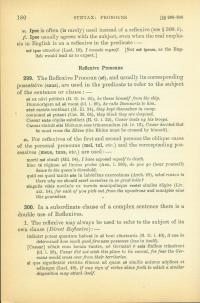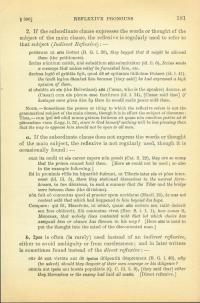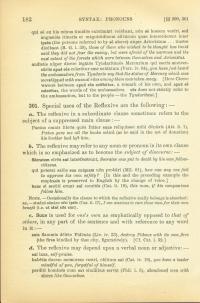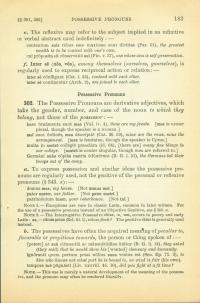299. The reflexive pronoun (sē), and usually its corresponding possessive (suus), are used in the predicate to refer to the subject of the sentence or clause.
Sē ex nāvī prōiēcit. (B. G. 4.25)
He threw himself from the ship.
Dumnorīgem ad sē vocat. (id. 1.20)
He calls Dumnorix to him.
Sēsē castrīs tenēbant. (id. 3.24)
They kept themselves in camp.
Contemnī sē putant. (Cat. M. 65)
They think they are despised.
Caesar suās cōpiās subdūcit. (B. G. 1.22)
Cæsar leads up his troops.
Caesar statuit sibi Rhēnum esse trānseundum. (id. 4.16)
Cæsar decided that he must cross the Rhine (the Rhine must be crossed by himself).
a. For reflexives of the 1st and 2nd persons the oblique cases of the personal pronouns (meī, tuī, etc.) and the corresponding possessives (meus, tuus, etc.) are used.
Mortī mē obtulī. (Mil. 94)
I have exposed myself to death.
Hinc tē rēgīnae ad līmina perfer. (Aen. 1.389)
Do you go (bear yourself) hence to the queen's threshold.
Quid est quod tantīs nōs in labōribus exerceāmus? (Arch. 28)
What reason is there why we should exert ourselves in so great toils?
Singulīs vōbīs novēnōs ex turmīs manipulīsque vestrī similēs ēligite. (Liv. 21.54)
For each of you pick out from the squadrons and maniples nine like yourselves.
300. In a subordinate clause of a complex sentence there is a double use of reflexives.
- The reflexive may always be used to refer to the subject of its own clause (Direct Reflexive).
Iūdicārī potest quantum habeat in sē bonī cōnstantia. (B. G. 1.40)
It can be determined how much good firmness possesses (has in itself).[Caesar] nōluit eum locum vacāre, nē Germānī ē suīs fīnibus trānsīrent. (id. 1.28)
Cæsar did not wish this place to lie vacant, for fear the Germans would cross over from their territories.sī qua sīgnificātiō virtūtis ēlūceat ad quam sē similis animus adplicet et adiungat (Lael. 48)
if any sign of virtue shine forth to which a similar disposition may attach itself - If the subordinate clause expresses the words or thought of the subject of the main clause, the reflexive is regularly used to refer to that subject (Indirect Reflexive).
Petiērunt ut sibi licēret. (B. G. 1.30)
They begged that it might be allowed them (the petitioners).Iccius nūntium mittit, nisi subsidium sibi submittātur, etc. (id. 2.6)
Iccius sends a message that unless relief be furnished him, etc.Decima legiō eī grātiās ēgit, quod dē sē optimum iūdicium fēcisset. (id. 1.41)
The tenth legion thanked him because [they said] he had expressed a high opinion of them.sī obsidēs ab eīs (the Helvetians) sibi (Cæsar, who is the speaker) dentur, sē (Cæsar) cum eīs pācem esse factūrum (id. 1.14)
[Cæsar said that] if hostages were given him by them he would make peace with themNote— Sometimes the person or thing to which the reflexive refers is not the grammatical subject of the main clause, though it is in effect the subject of discourse.
cum ipsī deō nihil minus grātum futūrum sit quam nōn omnibus patēre ad sē plācandum viam (Legg. 2.25)
since to God himself nothing will be less pleasing than that the way to appease him should not be open to all men
a.If the subordinate clause does not express the words or thought of the main subject, the reflexive is not regularly used, though it is occasionally found.
Sunt ita multī ut eōs carcer capere nōn possit. (Cat. 2.22)
They are so many that the prison cannot hold them.
[Here sē could not be used; so also in the example following.]
Ibi in proximīs vīllīs ita bipartītō fuērunt, ut Tiberis inter eōs et pōns interesset. (id. 3.5)
There they stationed themselves in the nearest farmhouses, in two divisions, in such a manner that the Tiber and the bridge were between them (the divisions).
Nōn fuit eō contentus quod eī praeter spem acciderat. (Manil. 25)
He was not content with that which had happened to him beyond his hope.
Compare:
Quī fit, Maecēnās, ut nēmō, quam sibi sortem seu ratiō dederit seu fors obiēcerit, illā contentus vīvat? (Hor. S. 1.1.1)
How comes it, Mæcenas, that nobody lives contented with that lot which choice has assigned him or chance has thrown in his way?
[Here sibi is used to put the thought into the mind of the discontented man.]
b. Ipse is often (is rarely) used instead of an indirect reflexive, either to avoid ambiguity or from carelessness; and in later writers is sometimes found instead of the direct reflexive.
cūr dē suā virtūte aut dē ipsīus dīligentiā dēspērārent (B. G. 1.40)
why (he asked) should they despair of their own courage or his diligence
omnia aut ipsōs aut hostēs populātōs (Q. C. 3.5.6)
[they said that] either they themselves or the enemy had laid all waste [Direct reflexive]
Quī sē ex hīs minus timidōs exīstimārī volēbant, nōn sē hostem verērī, sed angustiās itineris et māgnitūdinem silvārum quae intercēderent inter ipsōs (the persons referred to by sē above) atque Ariovistum . . . timēre dīcēbant. (B. G. 1.39)
Those of them who wished to be thought less timid said they did not fear the enemy, but were afraid of the narrows and the vast extent of the forests which were between themselves and Ariovistus.
Audīstis nūper dīcere lēgātōs Tyndaritānōs Mercurium quī sacrīs anniversāriīs apud eōs colerētur esse sublātum. (Verr. 4.84)
You have just heard the ambassadors from Tyndaris say that the statue of Mercury which was worshiped with annual rites among them was taken away.
[Here Cicero wavers between apud eōs colēbātur, a remark of his own, and apud sē colerētur, the words of the ambassadors. eōs does not strictly refer to the ambassadors, but to the people—the Tyndaritani.]
301. The following are special uses of the reflexive.
a. The reflexive in a subordinate clause sometimes refers to the subject of a suppressed main clause.
Paetus omnīs librōs quōs frāter suus relīquisset mihi dōnāvit. (Att. 2.1)
Pœtus gave me all the books which (as he said in the act of donation) his brother had left him.
b. The reflexive may refer to any noun or pronoun in its own clause which is so emphasized as to become the subject of discourse.
Sōcratem cīvēs suī interfēcērunt.
Socrates was put to death by his own fellow citizens.
Quī poterat salūs sua cuiquam nōn probārī? (Mil. 81)
How can any one fail to approve his own safety?
[In this and the preceding example the emphasis is preserved in English by the change of voice.]
hunc sī secūtī erunt suī comitēs (Cat. 2.10)
this man, if his companions follow him
Note— Occasionally the clause to which the reflexive really belongs is absorbed.
Studeō sānāre sibi ipsōs. (Cat. 2.17)
I am anxious to cure these men for their own benefit. (i.e. ut sānī sibi sint)
c. Suus is used for one's own as emphatically opposed to that of others, in any part of the sentence and with reference to any word in it.
suīs flammīs dēlēte Fīdēnās (Liv. 4.33)
destroy Fidenœ with its own fires
(the fires kindled by that city, figuratively). [Cf. Cat. 1.32.]
d. The reflexive may depend upon a verbal noun or adjective.
suī laus self-praise
Habētis ducem memorem vestrī, oblītum suī. (Cat. 4.19)
You have a leader mindful of you, forgetful of himself.
perditī hominēs cum suī similibus servīs (Phil. 1.5)
abandoned men with slaves like themselves
e. The reflexive may refer to the subject implied in an infinitive or verbal abstract used indefinitely.
Contentum suīs rēbus esse maximae sunt dīvitiae. (Par. 51)
The greatest wealth is to be content with one's own.
cui prōposita sit cōnservātiō suī (Fin. 5.37)
one whose aim is self-preservation
f. Inter sē (nōs, vōs) among themselves (ourselves, yourselves), is regularly used to express reciprocal action or relation.
inter sē cōnflīgunt (Cat. 1.25)
contend with each other
inter sē continentur (Arch. 2)
are joined to each other




